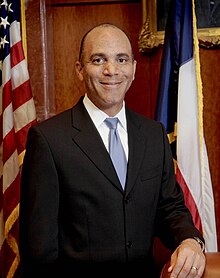Steven Wayne Smith is a Republican former Texas Supreme Court justice, who was defeated for renomination in 2004 through the active opposition of then-Governor Rick Perry. He was unseated by Paul W. Green. Smith again lost – very narrowly – a bid for nomination to the court in the March 7, 2006, GOP primary, when Perry again opposed his candidacy.

David Michael Medina is a former Justice of the nine-member Texas Supreme Court. He served in the Place 4 position. He was appointed by Governor Rick Perry in 2004 and subsequently elected to a full-term in 2006. Medina was defeated in the Republican runoff election in 2012 by John P. Devine. His tenure ended on December 31, 2012. All members of the court are Republican.
Tom Colbert is a former Associate Justice of the Oklahoma Supreme Court. He was appointed to the Court's District 6 seat in 2004, by Governor Brad Henry, becoming the first African-American to serve on the court. On January 4, 2013, he was sworn in as Chief Justice of the Supreme Court, and served In that post until January 2015. After completing his two-year term as Chief Justice, he resumed his previous position on the court as Associate Justice representing the 6th Judicial District. On January 19, 2021, Colbert’s retirement was announced by the Oklahoma Supreme Court, effective February 1 of the same year.
Joseph Michael Watt is a former Justice of the Oklahoma Supreme Court, who assumed the post in 1992. He was reelected in 1994, 1996, and 2002. From 2003 to 2007, he served two terms as Chief Justice. In 2005, he was reelected to an unprecedented second term as Chief Justice, despite a federal age discrimination lawsuit filed by the Court's then-Vice Chief Justice Marian P. Opala, then 83 years old, who claimed Supreme Court rules were changed to prevent Opala from becoming chief justice. Justice Watt sent a letter to Governor Mary Fallin on October 2, 2017, stating that he would retire from the Oklahoma Supreme Court effective December 31, 2017.
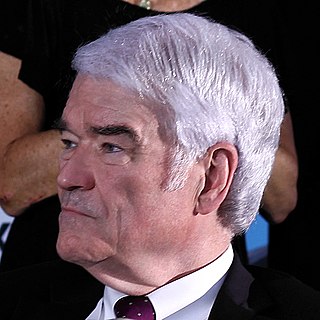
Nathan Lincoln Hecht is an American lawyer who served as the chief justice of the Supreme Court of Texas from 2013 until his mandatory retirement December 31, 2024. A Republican from Dallas, Hecht was first elected to the Supreme Court in 1988 and was reelected to six-year terms in 1994, 2000 and 2006. He secured his fifth six-year term on November 6, 2012. He was appointed chief justice by Governor Rick Perry on September 10, 2013, and was sworn into that position by retiring Chief Justice Wallace B. Jefferson on October 1, 2013.

Scott Andrew Brister is a former justice of the Supreme Court of Texas, who served from November 2003 until September 2009. He was appointed by Governor Rick Perry to serve the remainder of the term of Justice Craig T. Enoch. He was then elected to a regular six-year term in November 2004. Brister resigned from the court effective September 7, 2009, before the scheduled end of his term on December 31, 2010. He was succeeded on the court by Eva Guzman, the first female Hispanic to serve on the body. He is now employed as a Partner in the Austin office of the law firm Hunton Andrews Kurth. Brister was appointed on June 11, 2024 by Gov. Greg Abbott to the newly created Texas Fifteenth Court of Appeals.
Thomas Royal Phillips is an attorney with the Baker Botts firm in Austin, Texas, who was from 1988 to 2004 the Chief Justice of the Supreme Court of Texas. With nearly seventeen years of service, Phillips is the third-longest tenured Chief Justice in Texas history. He was appointed by Governor Bill Clements to fill a vacancy in the office in November 1987, becoming the youngest Chief Justice since Texas became a state. Phillips took office less than a month after CBS' 60 Minutes ran a highly publicized story, entitled "Justice for Sale?", which won widespread attention for its blistering critique of Texas' choice to elect judges by political party without campaign contribution limits. The broadcast alleged improperly close ties between several of the justices and their largest donors, who were amongst the state's most successful personal-injury trial lawyers. In campaigns that received national attention in 1988, Phillips and two other candidates running as Republicans won election to the Court by imposing voluntary limits on the size of campaign contributions. By winning, they joined Railroad Commissioner Kent Hance as the first Republican elected to statewide office since Reconstruction. Phillips, after serving the two years remaining on the term of his predecessor, Chief Justice John L. Hill, was elected to a full term in 1990. In each race he defeated one of his Democratic colleagues on the Court, Ted Z. Robertson in 1988 and Oscar H. Mauzy in 1990, who defended Texas' partisan judicial election system and declined to impose campaign contribution caps. Throughout his tenure, Phillips vigorously advocated a non-partisan appointment-retention election method of choosing Texas judges. While he was ultimately unsuccessful in this effort, like other Texas chief justices before and since, both the Legislature and the Supreme Court imposed restrictions on the amount, timing and source of campaign contributions to judges during his tenure.

J. Dale Wainwright is a former associate justice of the Texas Supreme Court, now in private practice with Greenberg Traurig, LLP in Austin, Texas.
The Texas Courts of Appeals are part of the Texas judicial system. In Texas, all cases appealed from district and county courts, criminal and civil, go to one of the fourteen intermediate courts of appeals, with one exception: death penalty cases. The latter are taken directly to the Texas Court of Criminal Appeals, the court of last resort for criminal matters in the State of Texas. The highest court for civil and juvenile matters is the Texas Supreme Court. While the Supreme Court (SCOTX) and the Court of Criminal Appeals (CCA) each have nine members per the Texas Constitution, the sizes of the intermediate courts of appeals are set by statute and vary greatly, depending on historical case filings and so that the justices on each court can timely adjudicate the volume of cases regularly before them. The total number of intermediate appellate court seats currently stands at 80, ranging from three, four, six, seven, nine, and thirteen (Dallas) per court.
SMU Dedman School of Law, commonly referred to as SMU Law School or Dedman School of Law, is a law school located in Dallas, Texas. Jason P. Nance serves as its current dean.

James E. C. Perry is an American judge. He is a former justice of the Supreme Court of Florida.

Eva Martinez Guzman is an American attorney, politician, and jurist who served as a member of the Texas Supreme Court from 2009 to 2021. In 2022, she became a partner at Wright Close & Barger, LLP in Houston, Texas.

Jeffrey Scott Boyd is an American lawyer who has served as a justice of the Texas Supreme Court. He was appointed to Place 7 on the court by Governor Rick Perry in the fall of 2012 to fill the seat vacated by Justice Dale Wainwright, and he won a full six-year term on the court in the 2014 election.
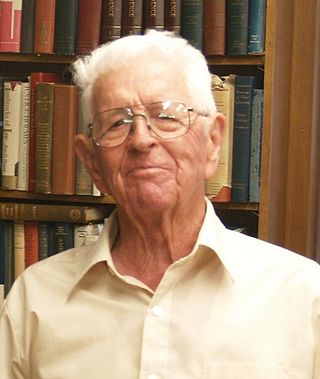
Andrew Jackson Pope Jr., known as Jack Pope, was an American judge, attorney, author and legal scholar who served as chief justice of the Supreme Court of Texas.
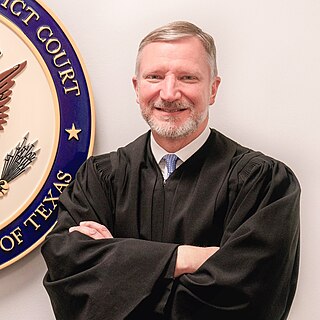
Jeffrey Vincent Brown is a United States district judge for the United States District Court for the Southern District of Texas and a former justice of the Texas Supreme Court. He was appointed to the U.S. District Court by President Donald Trump.
Carolyn Wright-Sanders is an American lawyer, jurist and a former Chief Justice of the Fifth Court of Appeals of Texas, serving in that position from November 17, 2009 to December 31, 2018.

The 2018 general election was held in the U.S. state of Texas on November 6, 2018. All of Texas's executive officers were up for election as well as a United States Senate seat, and all of Texas's thirty-six seats in the United States House of Representatives. The Republican and Democratic Parties nominated their candidates by primaries held March 6, 2018. Convention Parties nominated their candidates at a series of conventions. County Conventions held March 17, 2018, District Conventions held March 24, 2018, and a State Convention held April 14, 2018. At the present time there is only one Convention Party in Texas, that is the Libertarian Party. Other parties may seek to achieve ballot access.
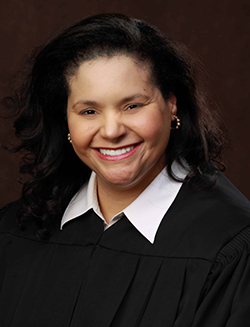
Ada Elene Brown is an American lawyer who is a district judge of the United States District Court for the Northern District of Texas. She is a former trial judge of the Dallas County courts and a former Justice of the Fifth Court of Appeals of Texas. She was the first African-American woman federal judge nominated by President Donald Trump and confirmed by the Senate. She is also the first African American woman to sit as a federal judge in the 140- year-history of the Northern District of Texas.
Jane Nenninger Bland is an American lawyer from Texas who serves as a justice of the Supreme Court of Texas.

Texas state elections in 2020 were held on Tuesday, November 3, 2020. Its primaries were held on March 3, 2020, with runoffs taking place on July 14.
